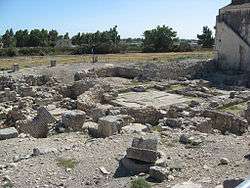Siponto
| Siponto | |
|---|---|
| Frazione | |
|
Piazza Sant'Andrea | |
 Siponto Location of Siponto in Italy | |
| Coordinates: 41°36′25″N 15°53′45″E / 41.60694°N 15.89583°ECoordinates: 41°36′25″N 15°53′45″E / 41.60694°N 15.89583°E | |
| Country |
|
| Region |
|
| Province | Foggia (FG) |
| Comune | Manfredonia |
| Elevation | 0 m (0 ft) |
| Demonym(s) | Sipontini |
| Time zone | CET (UTC+1) |
| • Summer (DST) | CEST (UTC+2) |
| Postal code | 71043 |
| Dialing code | 0884 |

Siponto (Latin: Sipontum, Greek: Σιπιούς) was an ancient port town of Apulia in southern Italy. The town was abandoned after earthquakes in the 13th century; today the area is administered as a frazione of the comune of Manfredonia, in the province of Foggia. Siponto is located around 3 km south of Manfredonia.
History
According to legend, Sipontum was founded by Diomedes, product of the union of the Homeric hero of the same name with the daughter of the king of the Dauni. Siponto was probably founded by the Dauni.
Sipontum was a flourishing Greek colony, its Greek name being Sipious (Σιπιούς); having fallen into the hands of the Samnites, it was retaken about 335 B. C. by King Alexander of Epirus, uncle of Alexander the Great. In 189 B. C. it became a Roman colony with its original Sipious name still used in Byzantine times, and in A. D. 663 it was taken and destroyed by the Slavs.
In the ninth century, Sipontum was for a time in the power of the Saracens; ln 1042 the Normans made it the seat of one of their twelve counties. The latter won a decisive victory there over the Byzantine general Argyrus in 1052.
According to legend, the Gospel was preached at Sipontum by Saint Peter and by Saint Mark; more trust, however, may be placed in the tradition of the martyrdom of the priest Saint Justin and his companions under Gallienus and Maximian about 255. The first bishop whose date may be fixed, was Felix, who was at Rome in 465. In the time of Bishop Lawrence, during the reign of Pope Gelasius I (492-496), there took place on Monte Gargano the apparition of Saint Michael, in memory of which the famous Monastery of the Archangel was founded.*Citation Needed*
About 688 Pope Vitalian was obliged to entrust to the bishops of Benevento the pastoral care of Sipontum, which was almost abandoned, but the see was re-established in 1034, and under Bishop Saint Gerard (1066) it became an archdiocese. The ancient cathedral remained still at Sipontum, but, with the building of Manfredonia by King Manfred of Sicily, who decided to rebuild Siponto in a new location, the archiepiscopal see was transferred to the latter city.
Michael of Zahumlje on 10 July 926 sacked Siponto, which was a Byzantine town in Apulia.[1] It remains unknown did he done this by Tomislav's supreme command as suggested by some historians. Apparently, Tomislav sent the Croatian navy under the Michael's leadership to drive the Saracens from that part of southern Italy and free the city.[2]
See also
References
Footnotes
Bibliography
- Cappelletti, Le Chiese d'Italia, XX (Venice, 1857)
- (Benigni, U.) (1910), Catholic Encyclopedia. (New York: Robert Appleton Company), s.v. "Archdiocese of Manfredonia. Retrieved July 31, 2008 New Advent
- Omrčanin, Ivo (1984). Military history of Croatia. Dorrance. ISBN 9780805928938.
- Rački, Franjo (1861). Odlomci iz državnoga práva hrvatskoga za narodne dynastie (in Croatian). F. Klemma.
External links
| Wikimedia Commons has media related to Siponto. |
